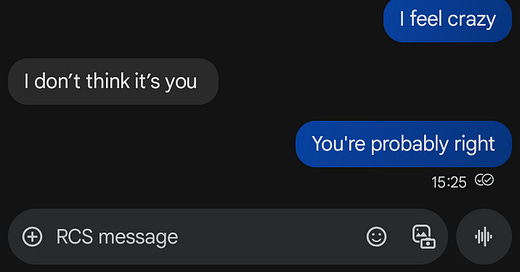July Medley
A medley of music, personal reflections, and "next-phase" Canyon Oak quandaries
After taking several meetings yesterday, I spent this morning alone, tidying and folding laundry while listening to the “strings w soul” playlist (find it on the Soul page>Music). I’ll share my current binge listens from that list below.
The first reminds me that we all may come in different “packages,” but we all have to navigate others’ assumptions and expectations of us.
The second one was playing at the build site yesterday. Listening to it brought me a buoyant feeling, yet it tells a real, painful story of a changing relationship. It resonates with the multiplex feelings that run through me (usually resulting in a tingly throb in my right wrist) whenever I think about my divorce.
As the creator and builder of something I care about and seek to grow (Canyon Oak), I feel a lot of pressure to be “out in the world” and “keeping pace” such that I remain “relevant.” The last couple of years have taught me that this human vulnerability—this thirst to be seen and validated—distracts me from my creativity and inner truth, both vital ingredients for living the life I want to live. Again and again, I have strengthened my ability to recognize and separate these external pressures from what I know to be my calling: inspiring and supporting others as they create lives meaningful to them. I will do this as a doctor and as the leader of Canyon Oak.
This has been a relatively quiet and contemplative month for Canyon Oak. I have a sensation of dipping my toe into “the next phase,” and after some mini-free-falling over the last couple of weeks (during which I texted several of you: “I feel crazy”), I know I need to stay disciplined around the routines that support my creativity and ability to tune into my inner knowing: most notably, sketching/painting and moving my body.
That is the only way the next steps become clear, and it will just take time.

Questions that I am sitting with:
What “product/service” is Canyon Oak offering? What “products/services” will we offer in the future?
How do we serve our members in a way that is both meaningful and (really) fun?
How do we incorporate art and creativity into our product/service offering?
How do we keep Canyon Oak feeling alive?
How do we balance charting our own course/staying true to ourselves with not reinventing too many wheels?
How do we ask for help? How do we know who to ask for help from?
Taha and I have made a few content updates on Canyon-Oak.org… small tidbits to enrich the Wisdom, Craft, and Soul collections. Here is a Craft-heavy taste:
In Craft>Advances and Possibilities, Tue Nguyen shared a fascinating article from Precision Medicine highlighting a recent study published in Molecular Therapy. Scientists created a chewing gum out of lablab beans that binds HSV and influenza viruses to decrease oral viral load and transmission. Human creativity!
In Craft>Foundations, Melody Giambastiani shared a short and engaging podcast episode focused on pelvic floor health—a neglected subject that is relevant to all of us.
In Craft>Practice, Craft, & Self-Knowledge, Emily Lu shared “The Intellectual Basis of Family Practice” by G. Gayle Stephens, M.D. Here are some excerpts that stood out to me on my first skim through:
The following are four common but incorrect arguments which have nothing to do with defining a discipline, but which are often used in a discouraging manner. …
1. A misunderstanding about omniscience. lt is assumed, incorrectly,
that a generalist is required to know too much. This takes the
conversational form of: “Nobody can know everything"; "I have enough
trouble with one field, I don't see how anyone can keep up with several
(or all)"; or patronizingly as, "l admire you as a general practitioner.
I'm not smart enough to do it."
Each of these statements reveals an assumption that anyone engaged in
a field that cuts across disciplinary lines is bound to be intellectually
cuckolded by one discipline or another. *Those who share this point of
view fail to understand the selectivity required by the generalist.*
Neither the word "general" nor the word "comprehensive" (as applied
to health care) imply knowing everything about everything. They do
indicate a range of interest and a level of expertise that is broad but
not inclusive. One can only guess at the numbers of medical students
frightened or shamed out of a generalist career by the fear of
omniscience as a requisite.
…
3. Uncertainty and ambiguity can be eliminated by fragmentation.
How many students have succumbed to this most seductive of fallacies-
that if one reduces the scope of one's field of interest, one can
escape uncertainty? In medical practice, this argument takes the form
of "How do I feel about myself when I look in the mirror? Am I a
good doctor? Am I doing all that can be done for my patients? ls there
someone else who can do more and better?" This may become a mistaken
rationale for specialization, but problems of identity, confidence,
and honesty are rarely settled by changing fields. These are not
knowledge problems
Identifying what can be known completely is unimportant. Pieces of
knowledge can never be separated from the whole without a "reductio
ad absurdum." All knowledge that keeps its relationship to the whole
continues to exhibit ambiguity, uncertainty, and some degree of
incomprehensibility.
Finally, I’ll leave you with two short, delightful videos:
One that Gabrielle VanSpeybroeck shared which captures us all on our quests to “eat healthy” in this day and age. It hasn’t made it on Canyon-Oak.org yet, but you’ll find it in Soul>Food in the future.
One that I have been sourcing inspiration and delight from today.
To walking on to our own beat,
Michelle




